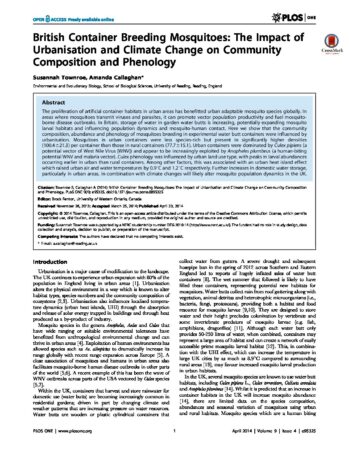
The proliferation of artificial container habitats in urban areas has benefitted urban adaptable mosquito species globally. In areas where mosquitoes transmit viruses and parasites, it can promote vector population productivity and fuel mosquito-borne disease outbreaks. In Britain, storage of water in garden water butts is increasing, potentially expanding mosquito larval habitats and influencing population dynamics and mosquito-human contact. Here we show that the community composition, abundance and phenology of mosquitoes breeding in experimental water butt containers were influenced by urbanisation. Mosquitoes in urban containers were less species-rich but present in significantly higher densities (100.4±21.3) per container than those in rural containers (77.7±15.1). Urban containers were dominated by Culex pipiens (a potential vector of West Nile Virus [WNV]) and appear to be increasingly exploited by Anopheles plumbeus (a human-biting potential WNV and malaria vector). Culex phenology was influenced by urban land use type, with peaks in larval abundances occurring earlier in urban than rural containers. Among other factors, this was associated with an urban heat island effect which raised urban air and water temperatures by 0.9°C and 1.2°C respectively. Further increases in domestic water storage, particularly in urban areas, in combination with climate changes will likely alter mosquito population dynamics in the UK.
Source: PLOS One
Publication Date: April 2014
